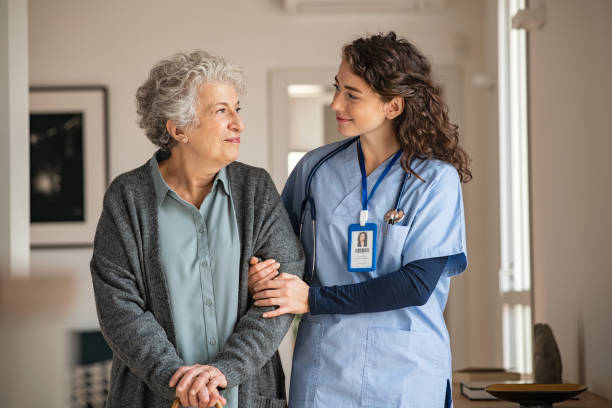The creation of telemedicine is revolutionizing healthcare across numerous sectors, and nursing houses are not any exception. With the increasing need for efficient and handy scientific take care of aged residents, telemedicine offers a promising solution that enhances the best of care, reduces costs, and improves patient consequences. This article explores how telemedicine is transforming telemedicine for nursing homes, highlighting its advantages, demanding situations, and future possibilities.

Enhancing Access to Care
One of the most huge advantages of telemedicine in nursing houses is its capability to provide immediately access to healthcare specialists. Traditionally, citizens of nursing homes have faced challenges in receiving well timed scientific attention because of transportation troubles, limited availability of specialists, and logistical constraints. Telemedicine bridges this hole by using allowing virtual consultations with medical doctors and professionals, therefore making sure that citizens acquire spark off medical interest without the want for bodily journey.
Improving Quality of Care
Telemedicine complements the first-rate of care in nursing houses by using facilitating ordinary monitoring and comply with-up of citizens' health conditions. Remote monitoring gadgets, which include wearable sensors and mobile fitness apps, allow healthcare companies to music important symptoms and different health signs in actual-time. This continuous tracking helps in early detection of capacity health problems, enabling timely interventions and lowering the probability of health facility readmissions.
Furthermore, telemedicine enables multidisciplinary care by connecting nursing home workforce with various experts, along with cardiologists, neurologists, and geriatricians. This collaborative approach ensures that citizens obtain complete care tailored to their unique desires, improving standard health effects.
Reducing Costs
The implementation of telemedicine in nursing houses can cause sizeable fee financial savings. By decreasing the need for emergency room visits and health facility admissions, telemedicine facilitates in slicing down healthcare expenses. Moreover, digital consultations dispose of transportation expenses for citizens and their households, making healthcare greater low-cost.
Nursing homes additionally advantage financially from telemedicine by optimizing workforce utilization. Remote consultations allow healthcare providers to control their time more effectively, decreasing the load on in-house medical body of workers and allowing them to awareness on direct patient care. This streamlined workflow not simplest improves staff productivity but also complements the overall operational efficiency of nursing homes.
Enhancing Resident and Family Satisfaction
Telemedicine now not simplest advantages healthcare carriers however additionally enhances the pleasure of nursing home citizens and their households. Virtual consultations offer a handy and cushty way for citizens to get hold of hospital therapy without leaving the familiar environment of the nursing domestic. This is in particular crucial for aged those who may also enjoy tension or pain while journeying outside scientific facilities.
Family members also respect the accessibility of telemedicine, because it allows them to take part in digital consultations and live knowledgeable about their loved ones' health. This involvement fosters a sense of reassurance and agree with, understanding that their own family contributors are receiving high-quality care.
Addressing Challenges
While telemedicine affords numerous benefits, it additionally comes with positive challenges that want to be addressed. One of the number one worries is the virtual divide, as some nursing domestic residents may lack get right of entry to to the necessary technology or won't be familiar with its usage. To triumph over this, nursing houses have to invest in consumer-friendly telemedicine structures and provide education for citizens and personnel.
Privacy and safety are also vital issues in telemedicine. Nursing homes ought to make certain that each one telemedicine interactions observe regulations which includes the Health Insurance Portability and Accountability Act (HIPAA) to defend residents' personal statistics.
Future Prospects
The future of telemedicine in nursing houses looks promising, with advancements in era poised to further enhance its effect. Artificial intelligence (AI) and machine studying algorithms can be integrated into telemedicine structures to provide predictive analytics, assisting healthcare vendors identify capacity health troubles before they end up vital. Virtual reality (VR) and augmented fact (AR) also can be utilized for immersive and interactive consultations, making healthcare greater enticing for citizens.
Telemedicine is also anticipated to play a essential position in addressing the growing call for for mental health services in nursing houses. Virtual counseling and remedy periods can offer residents with a lot-needed mental health assist, lowering feelings of isolation and improving standard properly-being.
Conclusion
Telemedicine is absolutely reworking healthcare in nursing homes, presenting a number of advantages from improved get entry to to care and greater pleasant of lifestyles to cost financial savings and extended satisfaction for citizens and their families. While challenges including the digital divide and privacy issues need to be addressed, the destiny of telemedicine in nursing houses is brilliant. With continued advancements in technology and elevated adoption of telemedicine practices, nursing homes are properly-placed to provide exquisite, green, and accessible healthcare to their residents, ensuring a higher satisfactory of lifestyles for the elderly population.





